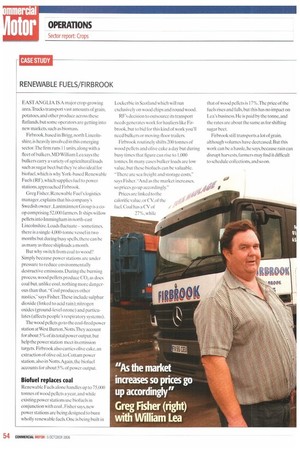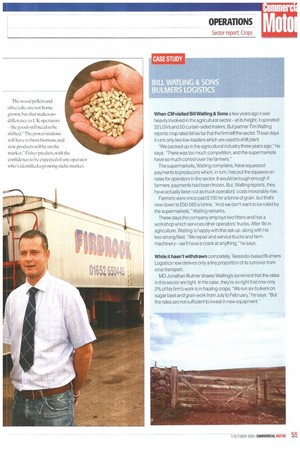RENEWABLE FUELS/FIRBROOK
Page 54

Page 55

If you've noticed an error in this article please click here to report it so we can fix it.
EASTANGL1A IS A major crop-growing area.Trucks transport vast amounts of grain. potatoes, and other produce across these flatlands, but some operators are getting into new markets, such as biomass.
Firbrook, based in Brigg, north Lincolnshire, is heavily involved in this emerging sector.The firm runs I I units, along with a fleet of bulkers. MD William Lea says the bulkers carry a variety of agricultural loads such as sugar beet but they're also ideal for biofuel,which is why York-based Renewable Fuels (RF), vvhich supplies fuel to power stations, approached Firbrook.
Greg Fisher, Renewable Fuel's logistics manager, explains that his company's Swedish owner ,Lantmannen Group is a coop comprising 52,000 farmers It ships willow pellets into Immingham in north-east Lincolnshire. Loads fluctuate — sometimes, there is a single 4,000-tonne vessel in two months but during busy spells, there can be as many as three shiploads a month.
But why switch from coal to wood? Simply because power stations are under pressure to reduce environmentally destructive emissions. During the burning process, wood pellets produce CO2 as does coal but, unlike coal, nothing more dangerous than that. Coal produces other nasties," says Fisher. These include sulphur dioxide (linked to acid rain ); nitrogen oxides (ground-level ozone) and particulates (affects people's respiratory systems).
The wood pellets go to the coal-fired power station at West Burton,Notts.They account for about 5% of its total power output, but help the power station meet its emission targets. Firbrook also carries olive cake, an extraction of olive oil.to Cottam power station, also in Notts. Again. the bionic.] accounts for about 5% of power output.
Biofuel replaces coal
Renewable Fuels alone handles up to 75.000 tonnes of wood pellets a year, and while existing power stations use biofuels in conjunction with coal ,Fisher says, new power stations are being designed to burn wholly renewable fuels. One is being built in Lockerbie in Scotland which will run exclusively on wood chips and round wood.
RF's decision to outsource its transport needs generates work for hauliers like Firbrook, but to bid for this kind of work you'll need bulkers or moving-floor trailers.
Firbrook routinely shifts 200 tonnes of wood pellets and olive cake a day but during busy times that figure can rise to 1,000 tonnes. In many cases bulker loads are low value, but these biofuels can be valuable. "There arc sea freight and storage costs," says Fisher."And as the market increases, so prices go up accordingly."
Prices are linked to the calorific value. or CV, of the fuel.Coal has a CV of / 27%,while that of wood pellets is 17% The price of the fuels rises and falls,but this has no impact on Lea's business. He is paid by the tonne, and the rates are about the same as for shifting sugar beet.
Firbrook still transports a lot of grain, although volumes have decreased. But this work can he a hassle, he says, because rain can disrupt harvests, farmers may find it difficult to schedule collections, and so on. The wood pellets and olive cake are not home grown, but that makes no difference to UK operators the goods still need to be shifted."The power stations will have to burn biomass, and new products will he on the market," Fisher predicts, with the confidence to he expected of any operator who's identified a growing niche market.
























































































































































































